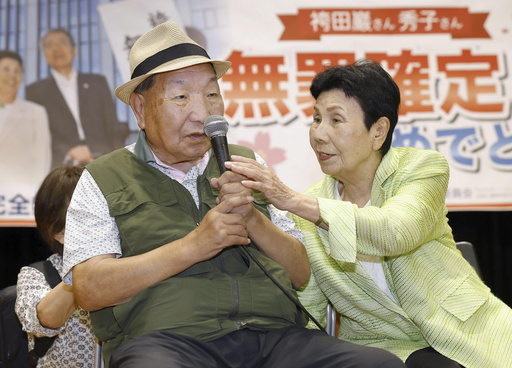
In a heartwarming turn of events, 91-year-old Hideko Hakamada finds herself invigorated as she embarks on a new journey with her brother, Iwao Hakamada, recently exonerated after spending nearly five decades on death row. Their shared struggle has only drawn them closer as they begin to redefine their lives following his acquittal.
For many years, Hideko dedicated herself to advocating for Iwao, who holds the unfortunate title of the longest-serving death row inmate in the world. Despite the long and emotionally exhausting legal battles, she never wavered in her support, even as his mental health deteriorated under the strain of isolation and despair.
In an exclusive conversation at her home in Hamamatsu, Hideko expressed her unwavering self-confidence, stating, “I did not belittle myself as the sister of a death row inmate. I lived without shame.” Through working as an accountant, she financed her brother’s legal efforts, traveling frequently to Tokyo to support him during his time on death row. Her commitment included shaping the narrative in the public eye to garner support for his cause.
The road was far from smooth for Hideko, and she sometimes felt overwhelmed by the enormity of the fight. “I was desperately working to win him a retrial, because that was the only way to save his life. Sometimes I felt lost,” she recounted, highlighting the challenges she faced while advocating against what felt like an “invisible power.”
To cultivate her identity outside of her brother’s ordeal, Hideko took a proactive approach, investing her resources into constructing a residential building that she now rents out, affording a space for both herself and Iwao. This initiative allowed her to carve out a sense of normalcy amidst their tumultuous journey.
The Shizuoka District Court notably acquitted Iwao Hakamada last month, ordering the release of a man wrongfully imprisoned based on coerced confessions and manipulated evidence. His plight had long been an example of the flaws in Japan’s judicial process, and while he was previously released on a retrial order in 2014, his civil rights were only fully reinstated after his recent acquittal.
Hideko expressed jubilation at the restoration of her brother’s civil rights, feeling particularly moved by the arrival of his voting ticket for the upcoming parliamentary elections, symbolizing his reintegration into society. “I will definitely go vote with him,” she stated, emphasizing the importance of this experience over the actual voting outcome.
However, the years of confinement have taken a toll on Iwao’s mental faculties, leaving him in a state where he oscillates between reality and hallucinations. Though he understands his newfound freedom, he doesn’t yet fully trust it. His interaction with the outside world is limited, and during their interview, Iwao quietly refrained from speaking with others, opting instead for given support from volunteers.
Convicted in 1966 for the murder of a company executive and three relatives in Hamamatsu, Iwao received his death sentence in 1968. The protracted appeal processes meant that he never faced execution, as Japan’s extensive legal system allowed for many opportunities to contest such drastic decisions.
After years of relentless effort, the Supreme Court finally rejected his first retrial appeal in 1993. It was only in 2008, thanks to Hideko’s advocacy, that a second appeal was pressed, ultimately leading to the favorable ruling in 2023. Hideko believes that her brother’s rigorous training as a boxer fortified him during these difficult years.
In his earlier years of imprisonment, Iwao maintained a bond with their family by writing daily letters to their mother, asserting his innocence and checking on her health. As the years passed, however, his letters reflected increasing anxiety and frustration at his wrongful conviction.
The severity of the death penalty in Japan is underscored by the lack of transparency surrounding executions, which occur without prior notice to those condemned. While Japan has only begun to publicly disclose the names of executed individuals post-2007, it remains one of the last holdouts for capital punishment among advanced nations.
As Hideko reflects on her brother’s journey, she highlights the need for change in Japan’s judicial system, advocating for greater accountability from prosecutors. Despite the challenges she faced and the negativity surrounding her brother’s case, she maintains a perspective of resilience, stating, “It is Iwao who deserves praise for surviving, for walking out of confinement after more than 50 years.”
While the legal battle took its toll on her, Hideko sought personal fulfillment through establishing her own home, an achievement she considers crucial in her life’s journey. She committed to maintaining her fitness through exercise, an essential routine that continues as she aids her brother and stays active at 91 years old.
“I’m not done yet,” she asserted with enthusiasm. “This is the beginning,” showcasing her spirited determination to embrace life fully as a new chapter unveils itself for both siblings.
